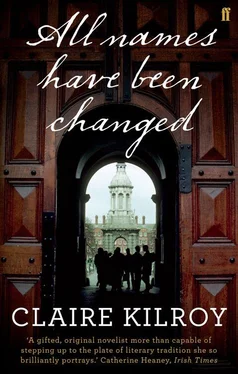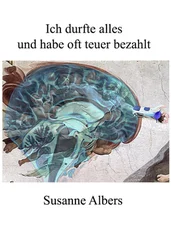Claire Kilroy - All Names Have Been Changed
Здесь есть возможность читать онлайн «Claire Kilroy - All Names Have Been Changed» весь текст электронной книги совершенно бесплатно (целиком полную версию без сокращений). В некоторых случаях можно слушать аудио, скачать через торрент в формате fb2 и присутствует краткое содержание. Год выпуска: 2010, Издательство: Faber & Faber, Жанр: Современная проза, на английском языке. Описание произведения, (предисловие) а так же отзывы посетителей доступны на портале библиотеки ЛибКат.
- Название:All Names Have Been Changed
- Автор:
- Издательство:Faber & Faber
- Жанр:
- Год:2010
- ISBN:нет данных
- Рейтинг книги:5 / 5. Голосов: 1
-
Избранное:Добавить в избранное
- Отзывы:
-
Ваша оценка:
- 100
- 1
- 2
- 3
- 4
- 5
All Names Have Been Changed: краткое содержание, описание и аннотация
Предлагаем к чтению аннотацию, описание, краткое содержание или предисловие (зависит от того, что написал сам автор книги «All Names Have Been Changed»). Если вы не нашли необходимую информацию о книге — напишите в комментариях, мы постараемся отыскать её.
All Names Have Been Changed — читать онлайн бесплатно полную книгу (весь текст) целиком
Ниже представлен текст книги, разбитый по страницам. Система сохранения места последней прочитанной страницы, позволяет с удобством читать онлайн бесплатно книгу «All Names Have Been Changed», без необходимости каждый раз заново искать на чём Вы остановились. Поставьте закладку, и сможете в любой момент перейти на страницу, на которой закончили чтение.
Интервал:
Закладка:
‘Giz?’ I whispered yet again.
Silent as the grave.
I was pleading with him by then, begging him to become Giz again, and not this awful lifeless changeling. I tried to make out his star shape in the darkness. I blinked and strained my eyes at his armchair, or at the spot I reckoned contained his armchair, because I was entirely disorientated by then, had entirely lost my bearings, could barely tell up from down. The part of the room at which I stared remained the blackest. It was so black, in fact, that I got it into my head that it wasn’t Giz at all. That thing which had split open his arm had been unleashed by the darkness and was taking form. It was right there in the room beside me. I could have reached out and touched it.
I tried to stand up but was unable to move, whether from fright or intoxication, I cannot say. My limbs pegged me to the sofa like a tent. I heard myself whimper, the sound loud and glandular in my ears. My head was issuing dogmatic instructions. Don’t make any noise, it warned me. It’ll hear you, and then it’ll get you. It’ll get you, and then it’ll hear you. So don’t make any noise.
‘It’s the tab,’ I managed to say out loud, a eureka moment.
Hearing myself speak fulfilled some normalising function, and I propelled myself to my feet. From that elevation, a slit of white was visible under Giz’s door, welcoming as a landing strip. Beyond it was the sagging corridor, the old carpet, electric light. If I could just make it to the door.
I lunged toward the light and collided with his coffee table. An almighty clatter as his wares crashed to the floor. ‘Careful now,’ warned my head, ‘You’ll wake it.’
I listened, my head cocked to one side like a bird. Not a whisper of breath out of him. I was hardly breathing myself. I had no notion of where Giz was presently located. He could have been hanging from the ceiling, for all I knew. I took another tentative step toward that three-foot-long chink of light, worried it would startle and take flight at any sudden movements. The thing to do was creep up without it noticing. That was the thing to do.
Something split in two underfoot with a loud brittle crack; I braced, ready for a hand to snatch my ankle. There were objects scattered about the floor that hadn’t been there when the light was on. They scuttled around the room like rats. ‘It’s okay,’ I assured myself, ‘This isn’t happening.’ The one thing that I could be certain of was that Giz was seeing worse. If I was caught in the ninth level of Hell, he was trapped in the Inferno itself.
The floor lurched, and I lost my footing. The bar of light beneath the door started to ascend. Smoothly and evenly, it rose higher, as if we were descending in an old-fashioned elevator cage. ‘Aw Jesus no,’ I whispered. The bedsit was sinking into the basement.
A wild thrashing broke out behind me. I hurled myself at the bar of white and miraculously connected with the door. I did not expect it to open, but open it did, flooding a benediction of light over me. I was all but crying by then.
The arc of light from the corridor did not extend as far as Giz’s armchair, just to his runners, which were no longer glaringly white as of old. He was flipping about like a landed fish. At least he wasn’t dead. I pulled his door shut and, to my shame, held the lever of the handle in place with my good hand, just in case, God forbid, he tried to come after me.
*
When all fell quiet inside, as it quickly and ominously did, I crept upstairs to my room and got into the bed without undressing. A full day and a half without sleep, yet I was scared to close my eyes. I couldn’t lie facing the wall because ghouls seeped out of the corner as soon as my back was turned, and I couldn’t lie facing the corner because hands stretched out of the wall. I couldn’t go downstairs because Giz, what was left of him, was waiting, and I couldn’t stay in the bedroom because Giz, or whoever he was now, was on his way up to get me. I propped myself upright on pillows and sat facing the door.
At some point during the night, the sound of breaking glass roused me. I opened my eyes with a gasp. My light was still on. The room was empty. People were shouting, chanting. It was coming from outside. Not outside my door, but outside the building, down below on the street. It sounded like an angry mob. An angry mob, of all things, out in the dead of night baying for blood, like something from a different century. My imagination was getting carried away with itself. It was going to town. Jesus, you’re worse than Aisling, I told myself, trying to make a joke out of the whole thing. When that didn’t work, I put my hands to my ears and blocked the angry mob out with my palms.
*
Next time I opened my eyes it was daytime. Around about noon, judging by the light. I checked my watch. Gone. Sitting on Antonia’s bedside table. Fuckhead. Are you happy now? My knuckles had puffed and dried to black scabs. I couldn’t straighten my fingers.
I stood outside Giz’s door and knocked with my good hand, but not very hard, if I’m honest. He didn’t answer. It was the result I was hoping for. I headed down the stairs. My relief was short-lived. It occurred to me that Giz was dead.
I went back up to his door and knocked harder. ‘Giz,’ I called. No response. I pressed my ear to the door. Silence. I tried the handle. Locked. I put my eye to the keyhole. His armchair was directly in my line of vision, and his armchair was empty.
Daylight was a strained compound of nerves after the lurid night that was in it. I had shed a protective layer. Everything in me blinked and blenched, a colony of insects when their rock is lifted. So when I stumbled out squinting onto the street and registered in my peripheral vision the funeral wreath hanging from the front door of the house on Mountjoy Square, my initial reaction was to assume that it wasn’t actually there. It was another demon, the kind of thing Glynn saw in his cups, the kind of thing I saw in mine.
It was only when I slammed the door and heard something tinkle down the steps in my wake that I turned around to gape at the wreath. And then gaped at what had fallen out of the wreath. There by my feet, a hypodermic needle. I looked up. A star-shaped hole in Giz’s window. Evil had come to our door as we’d slept. Evil had left a calling card. I ran up the steps and plucked the card from its holder. PUSHERS OUT , it read.
*
There was no dole queue trailing out the door of the labour exchange on Gardiner Street. That was the first bad sign. The roads were deserted, just the odd car here and there, as on Christmas Day. The local shops were shuttered. A grown man with a tricolour knotted around his neck planted himself in my path and vomited down his front. I stepped around him.
A cloud as faded and discoloured as an old military uniform was about to occlude the sun. I watched it loom over the Custom House with the stealth of a cut-throat. The delirium of that last blast of sunlight before rain, the sun-shot world on the brink of condensing — Gardiner Street was fleetingly gilded with such beauty that I was overcome with sadness that it could not always be this way. The cloud dispatched its bright-yellow quarry briskly; there was no struggle. A tidal wave of shadow came racing along the pavement. My heart started to pound.
I gritted my teeth and kept going, kept going, kept staggering on regardless, with hardly a thought as to where I was off to, and in such a hurry too. The gulls were out in force, screaming their prophesies of doom as the first heavy raindrops spattered the pavement. The streets grew darker with every step I took, the city a coffin being lowered into a grave.
Very few cars on the quays either. I crossed Butt Bridge down the broken white line of the central traffic lane. The Liffey was an opaque limestone grey in the grainy light. Water that was not translucent was no longer just water, surely. That’s what ran through my mind as I hurried along. There was more to that river than it was letting on. A thunderous rain was unleashed on us then.
Читать дальшеИнтервал:
Закладка:
Похожие книги на «All Names Have Been Changed»
Представляем Вашему вниманию похожие книги на «All Names Have Been Changed» списком для выбора. Мы отобрали схожую по названию и смыслу литературу в надежде предоставить читателям больше вариантов отыскать новые, интересные, ещё непрочитанные произведения.
Обсуждение, отзывы о книге «All Names Have Been Changed» и просто собственные мнения читателей. Оставьте ваши комментарии, напишите, что Вы думаете о произведении, его смысле или главных героях. Укажите что конкретно понравилось, а что нет, и почему Вы так считаете.












